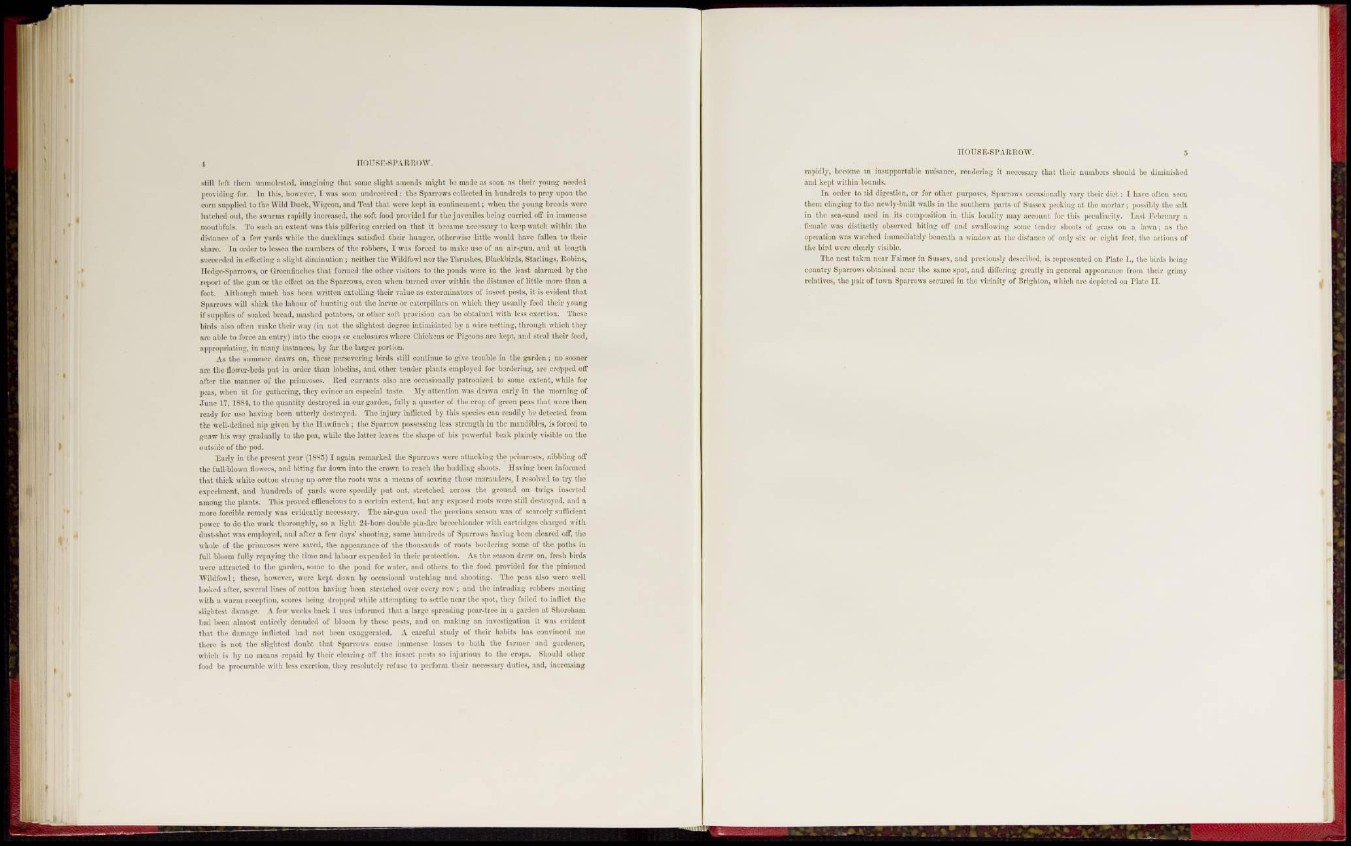
4 HOUSE-SPARROW.
still left lliciu unmolested, imagining that some slight amends might li • made as s urn a- their young needed
providing for. In this, however, I was soon undeceived: the Sparrows collected in hundreds to prey upon the
corn supplied to the Wihl Duck, Wigeon, and Teal that were kept in conllneuicnt; when the young broods were
hatched out, the swarms rapidly increased, the soft food provide! for the juveniles being carried nIF in immense
mouthful*. To such an extent was this pilfering carried on that it b-oame necessary to ke >p watch within thn
distance of a few yard* while the ducklings satisfied their hunger, otherwise little would have fallen to their
share. In order to lessen the numbers of the robbers, 1 was forced to uiike use of an air-gun, and at length
succeeded in effecting • slight diminution ; neither the Wildfowl nor the Thrushes, Blackbirds, Starlings, Robins,
lledge-S|i:irrovvs. or tireeutiuche. that formed the other i isitors to the ponds were in the least alarmed by the
report ut the gun or the etfect on the Sparrows, even when turned over within the distance of little more than a
foot. Although much has been written extolling their value as exterminators of insect pests, it is evident that
Sparrows will shirk the labour of hunting out the larvio nr caterpillars on which they usually feed their young
if supplies of soaked bread, mashed potatoes, or other soft provision can be obtained with less exertion. These
birds also often make their way (in not the slightest degree intimidated by a w ire netting, through » hieh they
arc able to force an entry) into the coops or enclosures where Chickens or Pigeons are kept, and steal their food,
appropriating, in many instances, by far the larger portion.
As the summer draws on, these persevering birds still continue to give trouble in the garden ; no sooner
arc the flower-beds put in order than lobelias, and other teudcr pi tuts employed for bordering, are cropped off
after the manner of the primroses. Red currants also are occasionally patronised to some extent, while for
peas, when fit for gathering, they evince an especial taste. My attention was drawn early in the morning of
.1 one 17, Iss |, t,, the quantity destroyed in our garden, fully a quarter of the crop of green peas that were then
ready for use having 1 n utterly destroyed. The injury inflicted by this species can readily be detected from
the well-dcl'med nip given by the Hawfinch ; the Sparrow possessing less strength in the mandibles, is forced to
gnaw his way gradually to the pea, while the latter leaves the shape of his powerful bank plainly visible on tho
outside of the pod.
Early in the present year (ISSj) I again remarked the Sparrows were attacking the primroses, nibbling at
the full-blown flowers, and luting far down into the crown to reach the budding shoots. Having 1M Informed
that thick white cotton strung up over the roots was a means of scaring those marauders, I resolved to fry the
experiment, and hundreds of yards were speedily put out, stretched across the ground on twigs inserted
among the plants. This proved efficacious to a certain extent, but any exposed roots were still destroyed, and a
more forcible remedy was evidently necessary. The air-gun used the previous seu-on vias of scarcely sufficient
power to do the work thoroughly, so a light 2l-bore double pin.lire breechloader with cartridges charged with
dust-shot was employed, and after a few days' shooting, some hundreds of Sparrows 'laving been cleared off, tho
whole of the primroses were saved, the appearance of the thousands of roots bordering some of the paths in
full bloom fully repaying the time and labour expended ¡11 their protection. As the season drew on, fresh birds
were attracted to the garden, some to the pond for water, and others to the food provided for the pinioned
Wildfowl| these, however, were kept down by occasional watching and shooting. The pens also were well
looked alter, several hues of cotton having been stretched over every row ; and the intruding robbers meeting
w rli a warm reception, scores being dropped while attempt ins to settle near the spot, they failed to inflict the
slightest damage. A few weeks back I was informed that a large spreading pear-tree in a garden at Shorehani
had lieen almost entirely denuded of bloom by these pests, and on making an investigation it was evident
that the damage inflicted had not been exaggerated. A careful study of their habits has convinced me
there is not the slightest doubt that Sparrows cause immense tosses to both the farmer and gardener,
which is by no means repaid by their clearing off the Insect pe-is so injurious to the crops. Should other
food be procurable with less exertion, they resolutely refuse to perform their necessary duties, and, i
ITOUSK-SPAllllOW.
rapidly, become an insupporlal.de nuisance, rendering it necessary that their numbers should be diminished
and kept within bounds.
I n order to aid digestion, or for other purposes, Sparrows occasionally vary their diet : I have often seen
them clinging to the newly-built walls in the southern purls of Sussex pecking at the mortar ; possibly the salt
in the sea-sand used in its composition in this locality may account for this peculiarity, Inst February a
female was distinctly observed biting off and swallowing some lender shoots of grass on a lawn; as thn
operation was watched immediately beneath a window at the distance of only six or eight feet, the actions of
the bird were clearly visible.
The nest taken near Palmer in Sussex, and previously described, is represented on Plate I., the birds being
country Sparrows obtained near the same spot, and differing greatly in general appearance from their grimy
relatives, the pair of town Sparrows secured in the vicinity of Brighton, which are depicted on Plate I I.